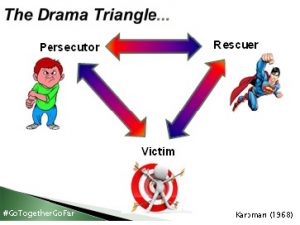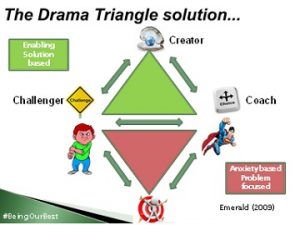NHS Wales discusses implementing a coaching and mentoring mindset
- 5 Min Read
James Moore, Assistant Director OD at NHS Wales, Welsh Ambulance Services joined HRD Connect to talk about the importance of mentoring and coaching. In a demanding workplace such as the public sector, employees often struggle with staying motivated and positive. James shares his thoughts and leadership techniques to tackle difficult situations, which can be applied […]
- Author: Unzela Khan
- Date published: Jun 23, 2017
- Categories

James Moore, Assistant Director OD at NHS Wales, Welsh Ambulance Services joined HRD Connect to talk about the importance of mentoring and coaching.
In a demanding workplace such as the public sector, employees often struggle with staying motivated and positive. James shares his thoughts and leadership techniques to tackle difficult situations, which can be applied to any workplace.
The ‘drama triangle’
In the 1960s, Steven Karpman introduced the ‘drama triangle’ after observing human behaviour, he observed that humans need to be wary of this drama triangle as it can be detrimental.
The theory consists of three elements or types of people in the workplace, the rescuer, the victim, the persecutor.
In the workplace, these three roles can be interchangeable, for example an employee may see their manager as a prosecutor, even if the manager deems themselves to be a rescuer. In that case, the employee may feel like the victim.
As a victim, the employee may seek help from a rescuer in the help of either a colleague or trade union – in turn making the manager feel like a victim.
As a counter to this, he suggests that the inverted triangle is what companies need to aim towards.
The inverted triangle looks at these roles differently: in this you have the creator, the coach and the challenger.
James says: “David Emerald in 2009 suggested that the thing we are trying to do in the work place is rather than having colleagues and in particular, subordinates as victims – we want them to be creators. This is the inverted drama triangle that we need to try and create.”
“It starts being about coaching and challenging, the people in the organisation create their own solutions – in this case, employees take decisions themselves rather than being told what to do, and make decisions about their own health and well-being rather than expecting the service to be provided.”
Embedding a coaching and mentoring culture
Changing mindsets is important when a company needs to embed a coaching and mentoring culture.
In the Welsh Ambulance Services, a formalised structure aims to tackle the challenges that come with coaching. James shares the idea of ‘formalised coaching’ which includes qualifying stages and levels.
James says: “This includes our chief executives and executive directors; we are trying to change all behaviours. These are the key ways we have a very clear sense of our story, what we are trying change from, and where are we going to – this is supported by sufficient resources, willpower and focus.”
He added that it is also important to teach employees to get into conversations where they are able to ask patients to think of solutions – much like in the workplace where a mentoring technique may be to ask employees to think of what they hope to achieve.
He says: “The job is to listen first instead of diving in and taking control. We teach our paramedics to do this and it’s exactly the same as leadership and managers, rather then you taking ownership you can ask what your employee wants out of this.”
The reverse mentoring strategy
As a leader, James suggests that an approach where you are humble and anti-hubristic is vital. This is where the reverse mentoring strategy steps in, an approach that allows not only mentoring, but also one that encourages leaders to be inclusive.
James said: “If you take someone like Donald Trump – my sense is personally that he thinks he knows the answer to everything and doesn’t listen very much to anyone else, which is hubris at its highest.
“The thinking we are trying to implement with reverse mentoring is: ‘I don’t know the answer, as a senior person I am going to ask some people to mentor me, particularly if they are junior to help me find the answer.’ It is about seeking answers, it is the idea that more heads are better than one.”
Staying positive in a demanding job
Employee motivation is one of the most important aspects of business performance – if your employees are motivated, they will produce good work and so the company will thrive.
Focusing on the negatives is detrimental during a long day, especially in the healthcare world where employees are dealing with difficult situations. However, the balance needs to be right – employees are encouraged to acknowledge that the negatives are necessary to an extent, as this is how you can see the positives.
key element to staying positive, dedicated and motivated actually comes down to the ability to make your own decisions, says James.
“The underpinning idea forming our approach is that people are the healthiest and happiest when they have the maximum level of control, e.g. in decision making, so when they have the ability to make decisions on what they do and how they do it.”
He concludes: “Healthy happy colleagues give healthy happy services, your own well-being as an employee is paramount. If you feel looked after, you will give your best.”





